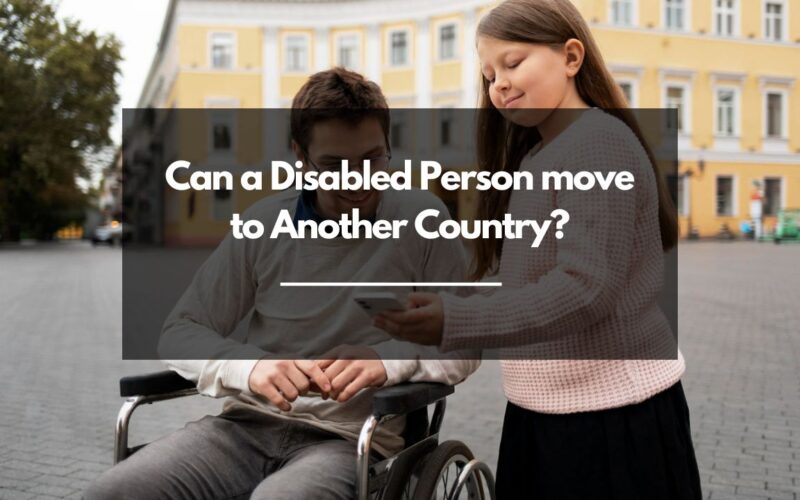As an Amazon Associate, I earn a small commission from qualifying purchases. Learn more about this.
It’s a big world out there, filled with countries that might offer a better fit for individuals with disabilities.
From improved accessibility to inclusive social policies, the allure of moving abroad can be tempting. But before packing up your life and starting anew in a foreign land, there are crucial factors to consider, especially when you’re disabled.
In this post, we’ll take a closer look at what it takes to move to another country as a disabled person.
Can a disabled person move to another country?
Well, let’s start by addressing the elephant in the room – yes, a disabled person can move to another country.
It’s important to affirm this from the outset because there’s a common misconception that disability equates to limitation, but that’s far from the truth. In fact, individuals with disabilities lead fulfilling lives and make significant moves, every day. For instance, take a look at Jon Morrow, the founder of smart blogger.
However, that doesn’t mean it’s a walk in the park.
Moving countries, for anyone, can be a complex process with lots of moving parts. Now imagine adding an additional layer of complexity to this process.
You’ve got to think about healthcare – will your new country have the medical facilities you need? Will your health insurance cover you internationally or will you need to find a new provider? These are just some of the questions you might find yourself asking. And yes, it’s very important you do.
Then there’s the question of accessibility.
Are the places you’ll need to frequent – such as work, school, or the grocery store – accessible? Will you be able to navigate the city with ease? This extends to public transportation as well – are buses, trains, and other forms of public transit equipped to accommodate your needs?
In fact, these are the most important aspect.
And let’s not forget about social acceptance. How does the new country view disability? Are there strong anti-discrimination laws in place to protect your rights?
Despite these challenges, many individuals with disabilities have successfully relocated and built new lives in different countries. It may require more planning, research, and preparation, but it’s definitely possible.
The key is to approach the process with an open mind, a lot of patience, and the understanding that there might be a few bumps along the way.
What Countries Rank Bests for Disabled People
Now, let’s go straight to the list of these countries…
Sweden

Leading the pack is Sweden, which is widely recognized for its strong commitment to equal rights and opportunities for all.
The Swedish Act Concerning Support and Service for Persons with Certain Functional Impairments provides a robust framework for supporting disabled individuals.
The country’s focus on designing accessible public infrastructure, ensuring equal employment opportunities, and providing tailored educational programs are also worth noting.
Germany
Next is Germany, where a comprehensive set of laws ensures that individuals with disabilities can participate fully in society.
The country’s efforts extend from barrier-free design in public and private buildings to equal access to education and employment opportunities. Moreover, the German health system is particularly robust, providing high-quality care and support for people with disabilities.
Zealand
New Zealand also ranks high due to its strong commitment to inclusive education and healthcare, along with its robust disability legislation.
The New Zealand Disability Strategy provides a framework for protecting the rights of disabled individuals, and the country has established strong social support systems to ensure the well-being of its disabled population.
Canada

Canada’s Accessible Canada Act, passed in 2019, is a milestone legislation that envisions a barrier-free Canada.
The Act applies to sectors under federal jurisdiction, like banking and telecommunications, with an aim to identify, remove, and prevent barriers for people with disabilities. Furthermore, employment equity and human rights laws ensure fair opportunities for everyone.
UK
Lastly, the United Kingdom has made substantial progress in terms of legislation and social attitudes towards disabled people.
The Equality Act 2010 provides legal protection against discrimination, ensuring equal treatment in areas such as employment, education, and access to goods and services.
What Countries Ranks least for Disabled people
Now, even if you can’t meet up with the countries that works best for disable people, there are definitely countries you want to be avoiding. We’d be talking about them here, however take note that this is not an exclusive list.
Yemen
A prominent example is Yemen. The country’s ongoing conflicts and political instability have had significant impacts on all its citizens, but the situation for those with disabilities is particularly dire.
Essential services and support for people with disabilities are severely lacking, and many struggle to access basic needs like food, water, and medical care.
Central African Republic
Moving our lens to Africa, we encounter the Central African Republic (CAR).
Despite some legislation intended to protect disabled persons, enforcement is weak, and the services available are inadequate.
Infrastructure in the country is not disability-friendly, with limited accessibility to public places and scant opportunities for disabled individuals.
Unfortunately, this is the same thing in most african countries.
North Korea
Similarly, North Korea is another country where the situation is grave.
The government provides little information about the condition of disabled people, and international observers have raised concerns about their treatment and the lack of resources available to them.
The restrictive environment and information scarcity make it difficult to precisely evaluate the extent of the issues faced by disabled individuals in North Korea.
Aghanistan
In South Asia, we find Afghanistan, a country ravaged by decades of war, where life for disabled individuals is extremely challenging. Basic infrastructure and facilities are lacking, and there is very little social and financial support.
Conclusion
While moving to another country as a disabled person is certainly feasible, it requires thoughtful planning and thorough research. Different countries offer various levels of support and accessibility, so it’s crucial to choose a destination that will best accommodate your unique needs and enhance your quality of life.







